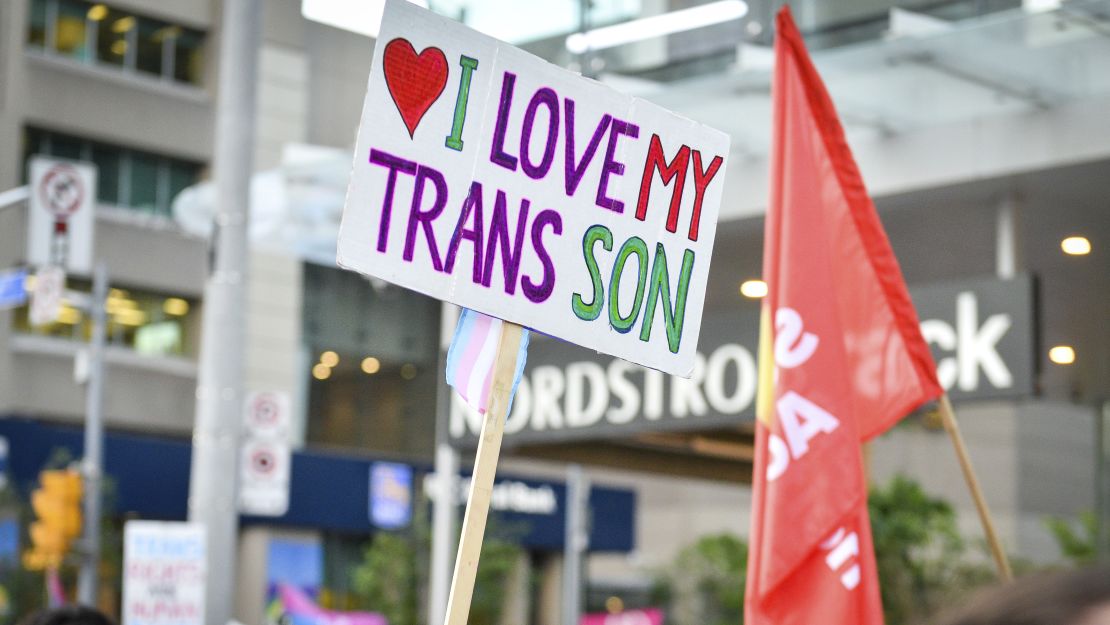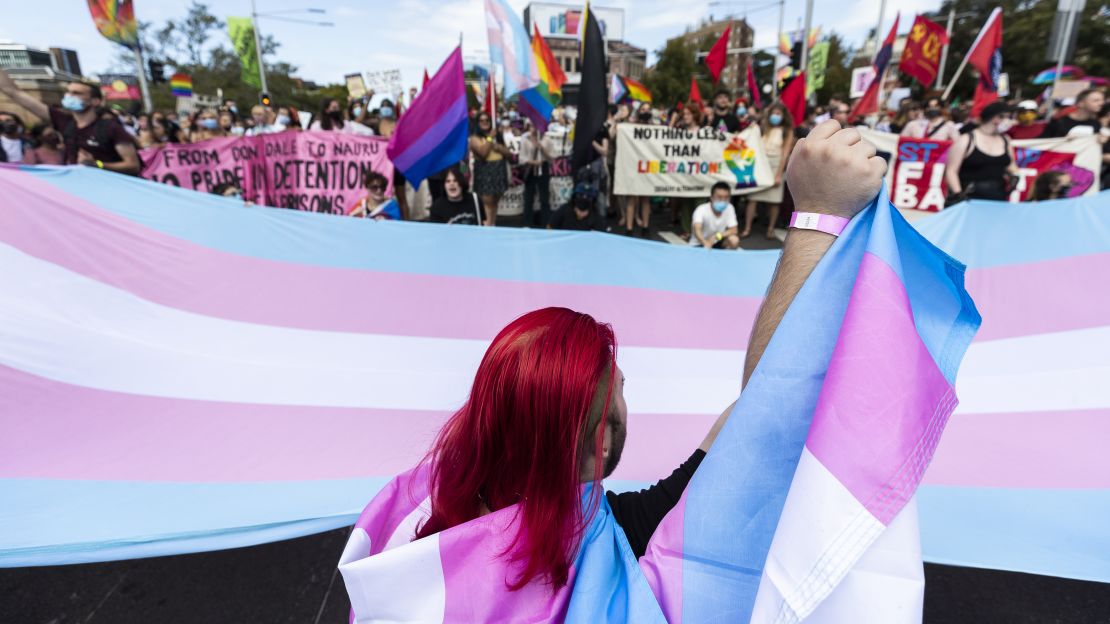The attacks on kids who identify as transgender keep coming.
Arkansas in early April became the first state to ban gender-affirming care including puberty blockers and cross-sex hormones, for children under 18. West Virginia signed a bill into law that prohibits transgender girls and women from participating in girls’ and women’s secondary school sports teams in late April.
And in mid-May, the Texas state legislature voted to approve a ban on gender-affirming care for kids under 18; the bill died in the House at the end of May, though Texas Gov. Greg Abbott may decide to resurrect it in June.
Dozens of states are considering bills that would limit what activities and care trans kids can legally access.
“Parents of trans kids are pretty shaken,” said Liz Dyer, founder of Mama Bears, an organization dedicated to supporting, educating and empowering parents and guardians of LGBTQ kids and the LGBTQ community. “It’s scary to know that people are targeting you and your family.”
“It’s not just the bathroom. It’s not just the playing field,” said “The Bold World” author Jodie Patterson, mother to a 13-year-old trans boy — who plays on a boys’ basketball team. “It’s about identity, it’s about ability, it’s about belief in a kid, and it’s about squashing all of that. We would survive and we would figure out a way, but it would change everything.”
‘How do I keep my kid healthy and safe?’

Lillian Rivera, director of family programing for the nonprofit Gender Spectrum, which supports gender-diverse youth, said families are panicked and confused, wondering why legislatures are going after children.
“It’s very confusing when people put forth legislation that will harm the health and well-being of children and teens,” Rivera said. “People are trying to figure out: How do I keep my kid healthy and safe when, at the state level, people are mounting attacks against them?”
Some of these bills both prevent physicians from providing medical care and insurance companies from covering them, despite the fact that some physicians and psychiatrists feel they are a critical part of care, along with therapy.
Puberty blockers, initially intended for use in kids with precocious puberty, are now used to delay the onset of puberty in kids with gender dysphoria — distress caused by incongruence between the sex they were assigned at birth and their gender identity. Though the blockers may affect bone density and height, any effects on puberty are thought to be reversible once kids stop taking them.
Bills that curtail this care may be seen by some politicians as easy wins and ways to gain some political ground, which makes them all the more frightening to those who feel the rights and well-being of gender-diverse youth are in danger.
“The bans are extremely harmful, just with their mere introduction,” said Dr. Scott Leibowitz, medical director of behavioral health for the THRIVE gender development program at Nationwide Children’s Hospital in Columbus, Ohio. “It basically sends a message to these young, vulnerable people that politicians are willing to sacrifice the youths’ emotional and physical well-being and health for political gain.” (THRIVE stands for Team-driven Healthcare that Respects Individuals and Values Emotions.)
Some advocates for kids who identify as transgender feel these bans are politically motivated. “This is using trans kids as a pawn to continue the social issues that really galvanize a radical contingent within our country that came to power in the last administration,” Rivera said. The anti-trans legislation is supported by conservative groups like the Family Council, while most major medical groups, including the American Academy of Pediatrics, oppose them.
Conflicting evidence, but persistent needs

While most of these US legislative bills are on the docket in majority Republican states, some European countries have also banned these medical interventions for children.
Several medical centers in Sweden no longer provide puberty blockers, hormones or surgeries to children under 18, and Finland has tightened its restrictions. This may be in response to people who later reverse their transition or because of what some see as the lack of reliable research about the safety and efficacy of some types of medical intervention or their long-term implications. For now, England will also no longer provide blockers and hormones to children under 16 after determining the research on puberty blockers and hormones was “subject to bias and confounding, and all the results are of very low certainty.”
Yet many in the field of trans youth medicine have found that puberty blockers and gender-affirming hormones are both relatively safe for the body and sometimes crucial for mental health, and regret is shown in some research to be rare. Leibowitz noted that no one is asserting that blockers and hormones are 100% appropriate for everyone; rather, they are important treatments to have among others, including comprehensive mental health assessment services.
“For a transgender person and in particular transgender youth, hormones can be a very important way of helping them develop emotionally and socially during a crucial time in their lives,” Leibowitz said.
“No doctor should be faced with the decision to prioritize their Hippocratic Oath over the law or vice versa. And that’s what these types of bans do.” Some doctors feel the conflicting research shows us that we need more gender-affirming care and careful study, not less.
Parents of and advocates for trans youth say that the medicine is life-saving because social and/or physical transition can bring psychological relief to some kids.
“Gender-affirming care is what is keeping my child alive, literally,” said Heather Crawford, whose nonbinary, gender-fluid child, Cass, is 14. Before Cass transitioned, they made a serious suicide attempt and spent two weeks in a psychiatric in-patient facility.
“We realized we needed to let this child transition,” Crawford said. “They clearly were in so much pain that they were willing to die.”
When Cass received a diagnosis of gender dysphoria, and the accompanying therapy and hormones, Crawford said their depression and anxiety lessened.
“If parents don’t support their kids, the result is often depression, anxiety, and sometimes even self-harm,” Dyer said.
Texas, where Cass lives, was also considering a bill to redefine “child abuse” to include administering gender-affirming care; the bill failed to pass before the state deadline, but may also come to the floor again.
“The state of Texas wants to not only make it impossible for my kid to get this care, but to criminalize it. Until you’ve had the experience of sitting next to your child in the ambulance,” Crawford said, “because they’re so miserable that they want to die, you need to not ask me about whether or not medical care for trans kids is a good idea or not. It’s just nauseating.”
Despite rumors that parents are rushing their kids into body-changing hormones and surgeries, the opposite, some advocates say, is true.
“If folks were really to learn about the health needs of trans youth, they would move away from the panic rhetoric and the lies that people tell,” Rivera said. “No parent is having their 8, 9, 10-year-old undergo surgery to change their bodies. But that’s the narrative that folks are putting forth.”
In her 20 years of experience working with gender-expansive youth and their families, Rivera said she has not seen any rush to medicate kids. “In my experience, parents are very, extremely measured in moving forward with medical interventions,” Rivera said. “They weigh the pros and cons for a long time.”
Looking for national support
At the same time that some states are targeting trans kids, US President Joe Biden has made more overtures of support to the trans community than any president before.
“To all transgender Americans watching at home — especially young people, who are so brave — I want you to know your president has your back,” he said during his address to a joint session of Congress on April 28.
This has given some hope to families who were edging toward hopelessness. “It’s encouraging when we hear that our president speaks out,” Dyer said. “What most people would really like to see happen is that we get a federal law passed, so they could get the medical care they need, so they would not be discriminated against in housing, education and sports.”
Resources for trans kids and families
Some families would like to see federal legislation that can more broadly protect trans kids, even as state legislatures weigh bills that would limit activities and care for these children. Crawford hopes specifically that The Rehabilitation Act of 1973 — which requires that kids with special needs get any services they need to achieve “free appropriate public education” — be expanded to include kids with gender dysphoria; most states have qualifying diagnoses like attention deficit hyperactivity disorder, anxiety or dyslexia, or disabilities covered under Individuals with Disabilities Education Act (IDEA), like autism of deafness.
She would also like the Biden administration to reinstate former President Barack Obama’s 2016 “Dear Colleague” letter, which prohibited discrimination against trans kids on the basis of gender identity; the administration of former President Donald Trump withdrew it in 2017.
“Schools had to provide an environment that’s free of harassment, including using the correct names and pronouns, and to commit students to participate in school activities and use the restrooms that are in line with their gender identity,” Crawford said.
Looking for a safe space
Because of the bans, some families are considering relocating to states that are more hospitable, or, at the very least, which aren’t actively trying to suppress trans people.
“Many of them are searching right now for a place that would be safe to move to,” Dyer said. It’s incredibly stressful and disruptive for these families. “Not only do you have to find a safe place, but they also have to think about changing jobs, getting a new place to live, finding medical professionals, gathering information about schools — it’s a lot and these families are really overwhelmed right now.”
Crawford is a native Texan, and she and her husband have lived in the state for the majority of their lives; her husband works for the state. “We are seriously considering leaving the state of Texas,” Crawford said. “I can’t in good conscience be here in a state that wants my child to die.”
The proliferation of these bills also puts pressure on parents to keep their kids informed without causing even more anxiety. “My son’s job is really to experience life right now,” Patterson said. “I have to protect him so that he’s not constantly thinking about these threats.”
Making laws with, not for, trans people
Many parents of trans kids question why cisgender politicians – those whose gender identities are in line with the sex they were assigned at birth – are so eager to make laws that affect trans people, often without consulting them. “It is ridiculous for cisgender people to make laws against trans people when they’re not even in the room,” Patterson said. “If you’re thinking about considering voting on a bill against trans people, do you know trans people? The proximity of trans people is crucial in this conversation.”
Crawford pointed out that transgender people are increasingly out and visible, and that diagnoses of gender dysphoria are more common, which should bring more care and compassion, not less. “Chances are you already know and love someone who’s going through it. You don’t have to understand it. You just have to respect it, because when you don’t respect it, you are putting these people’s lives in danger,” she said.
Get CNN Health's weekly newsletter
Sign up here to get The Results Are In with Dr. Sanjay Gupta every Tuesday from the CNN Health team.
It can be hard for cisgender people, who don’t understand what dysphoria feels like, to understand what’s at stake, Rivera, who is cisgender, said. “But I have seen the impact of dysphoria in children and teens manifest as anxiety, as self-harm, as suicidal ideation consistently throughout my two decades of working with young people. It’s not mine to understand. It is mine to respond to, to make sure that kids and children are taken care of.”
Dyer said that what people who don’t have trans kids need to understand is quite basic. “They need to remember that these parents love their kids like anybody loves their kids. They want their kids to be healthy and whole and safe.”
Lisa Selin Davis is the author of “TOMBOY: The Surprising History and Future of Girls Who Dare to Be Different.” Her essays, op-eds and articles have appeared in The New York Times, The Washington Post and CNN, among other publications.











